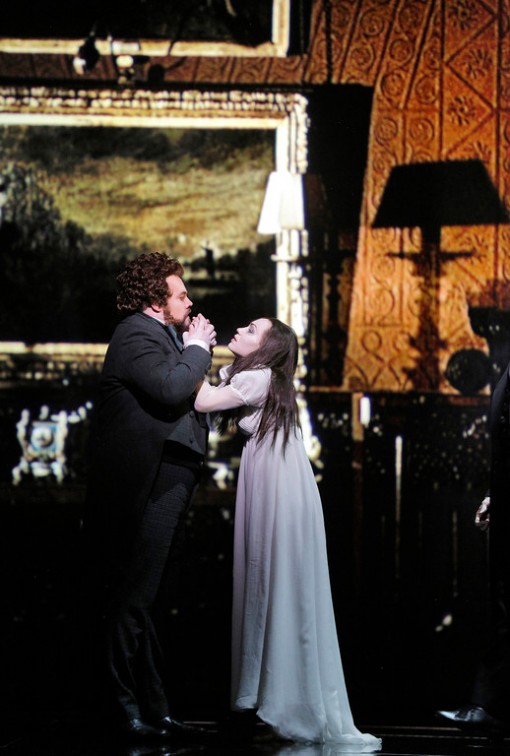To San Francisco Opera’s “Usher” double bill—Nevermore!

Brian Mulligan and Jamielyn Duggan in Gordon Getty’s “Usher House” at San Francisco Opera. Photo: Cory Weaver
Author of some of the most musical language in all of American literature, Edgar Allan Poe got his night at the opera Tuesday when a double bill of works based on his short story The Fall of the House of Usher was presented at San Francisco Opera. Yet while the evening had its musical and theatrically haunting moments, this pairing of Gordon Getty’s Usher House and Debussy’s La Chute de la Maison Usher struggled to make a compelling operatic case.
Brooding orchestral palettes, monologue-clogged librettos and a surfeit of projections were the dominant impressions of the evening. However tempting Poe’s tale of a deeply haunted house and a dying sister might have been, the atmospherically rich but dramatically static Usher story proved to be a daunting challenge. Even a night of heroic singing and some fevered acting by baritone Brian Mulligan, who played the central role of Roderick Usher in both pieces, got somewhat lost in all the heavy shadows.
Presenting two works based on the same source was a potentially intriguing premise. While it risked repetition, the bill did illustrate how differently the same material can be handled. In its American professional premiere, Getty’s piece, which introduced Poe himself as a major character and employed both a dancer (Jamielyn Duggan) and a singer (soprano Jacqueline Piccolino) to portray the wilting Madeline Usher, was more of a free variation on the original tale. Debussy’s Chute which remained unfinished at his death, hewed closer to the source while refocusing emphasis and exploring the story’s deeper emotional wellsprings.
First performed in 2006, in a version of the score substantially reconstructed and orchestrated by Robert Orledge, the Debussy exerted the stronger pull. Even with a blocky narrative built around successive solo passages, a sense of urgency took hold early on. As if conjuring him back to consciousness, Piccolino’s Madeline sang a wistful folk song over her brother Roderick’s recumbent form. Then, as the ailing girl vanished, a kind of battle for the hero’s tortured soul ensued.
Tenor Joel Sorensen, in a twitchy, penetrating turn as Roderick’s doctor, sought to protect his patient from the earnest entreaties of an old friend (baritone Edward Nelson). In a lengthy solo – essentially a musical monodrama that formed the heart of the piece – Mulligan spilled out his obsessive fixations on both Roderick’s ancestral past and his incestuous feelings for Madeline. The theme recalled the forbidden love that irradiates Pelléas et Mélisande, without any of that masterwork’s probing and wonderstruck music. It’s mostly and fittingly dark material here, with the orchestra growling in the lower registers, offset by occasional spasmodic outbursts from solo piano or brass or a sinuously coiled oboe. Conductor Lawrence Foster ably delivered this refashioned score’s overall contours and details.
Singing against video production designer David Haneke’s encroaching stone pillar facade, Mulligan was impressively possessed. Singing first in a narrow, almost defeated range, he began to heat up as the melodic line expanded and veered across interval leaps and swoons. He executed a few boyish dance moves, with his hand set raffishly atop his head. It was mesmerizing for while.
But the scene went on too long, broken at last by his friend’s attempt to distract Roderick with a story (well played by Nelson). Finally, in an apt reprise for Mulligan, who played the title role in SF Opera’s Sweeney Todd earlier this season, it was all Gothic Grand Guignol at the end, with a gigantic projection of the bloodied Madeline overseeing her brother’s own gruesome demise. A torrent of rain – real, not projected, in director David Pountney’s largely screen-dominated production – showered down.
The rains came first in Usher House, which opened the 21/2-hour evening. Getty, a noted philanthropist and San Francisco Opera donor, filled his portion of the evening with a ponderous book and largely unengaging score. Weighed down by bookish verbiage, the conversation between “Eddie” Poe (an eager but handcuffed tenor Jason Bridges) and Mulligan’s Roderick plowed on through pages of wooly academic dialogue. The language seemed to stifle the occasional wrinkles of musical charm – a strophic folk song, a lightly burlesqued ballroom waltz.
The opera’s ideas, both literary and musical, steadily wore thin. Getty threaded a few motifs through the score, but they never took hold or developed. Bass Anthony Reed looked and sounded imposing as Doctor Primus. And Duggan was both rag-doll limp and febrile as the dancing Madeline.
Without a strong musical or dramatic spine, however, this Usher devolved into incomprehensibility at times. Madeline’s onstage death was indifferently staged and scored. Even as the projected house crumbled and that storm set in, the music, all too fittingly, withered away to an anticlimax.
The Usher double bill continues through December 13. sfopera.com; 415-864-3330.